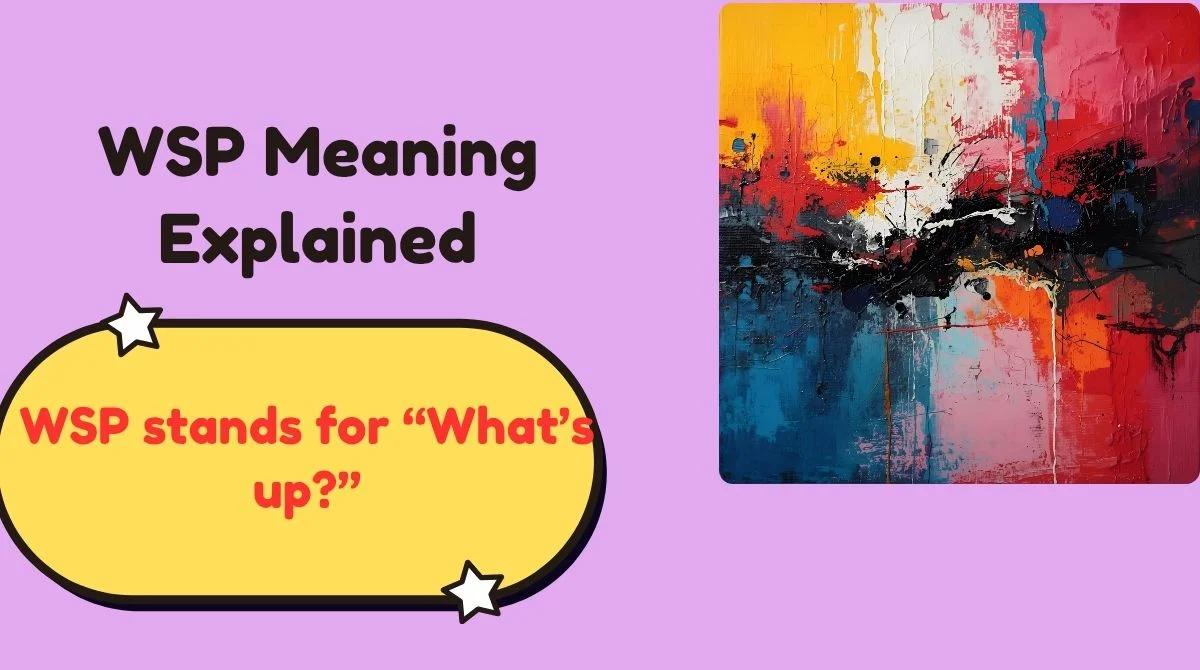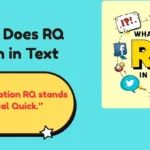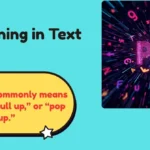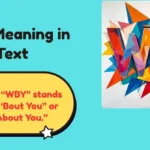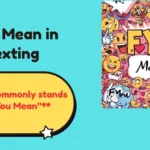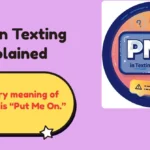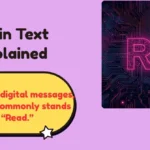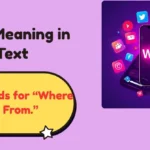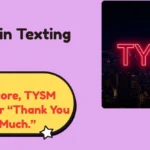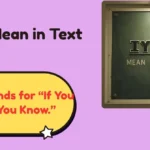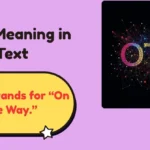Ever opened a message that simply said “WSP?” and wondered what it really meant? You’re not alone. In today’s fast-paced texting culture, short acronyms rule our screens. “WSP” has quietly become one of the most common greetings across Snapchat, Instagram, and TikTok—but not everyone uses it correctly.
At first glance, it looks simple. Yet, depending on who’s sending it and how it’s used, the meaning can shift dramatically. This guide breaks down the true WSP meaning, explores where it came from, and gives you smart, classy alternatives that can make your messages sound more natural and engaging.
Let’s dive right in.
What Does “WSP” Mean in Text?
WSP stands for “What’s up?” — a casual way to greet someone or start a conversation.
It’s an abbreviation used mostly in texting or online chatting, meant to save time and feel relaxed. Instead of typing the full phrase, people drop the vowels, turning it into “WSP.”
Here’s how it feels:
- Friendly and chill: Great for friends or people you talk to often.
- Casual: Ideal for texting, not for professional messages.
- Neutral tone: Depending on the context, it can be flirty, bored, or just polite.
Think of “WSP” as the modern cousin of “Sup?” or “Hey, what’s happening?” — short, informal, and quick.
Examples of “WSP” in Real Conversations
Let’s look at how people actually use “WSP” in different settings.
| Scenario | Message Example | Meaning / Tone |
|---|---|---|
| Friend | “WSP bro, you gaming tonight?” | Casual, friendly check-in |
| Crush | “WSP ;)” | Flirty and curious |
| Stranger | “WSP?” | Can feel dry or uninterested |
| Work Contact | “WSP with the report?” | Too informal — avoid |
| Old Friend | “WSP man! Long time no see.” | Warm, reconnecting tone |
👉 Tip: The shorter the message, the more context matters. If someone doesn’t know you well, “WSP” might seem cold or dismissive.
Origin and Evolution of “WSP”
“WSP” isn’t new—it’s the product of decades of communication shortcuts.
Back in the early 2000s, text messages had character limits. People started shortening common greetings like “What’s up?” to save space and time. Out came versions like “Sup,” “Wuzup,” and eventually, “WSP.”
With the rise of SMS texting, AIM chats, and later social media DMs, “WSP” spread like wildfire. By the time Snapchat and Instagram DMs became popular, it was already mainstream among teens and young adults.
Today, it’s part of the global texting vocabulary—simple, short, and instantly recognizable.
Tone and Context: Why “WSP” Can Sound Lazy or Dismissive
Tone is everything in digital communication. Without body language or facial cues, short words can easily be misunderstood.
For instance:
- “WSP?” can sound friendly if it comes from a close friend.
- The same message from a stranger might feel cold or uninterested.
- Used in dating apps, it can make you seem like you didn’t put in much effort.
Example comparison:
- “WSP, been a while! How have you been?” ✅ Warm and interested.
- “WSP.” ❌ Dry, emotionless, or lazy.
Think of “WSP” as texting shorthand—it’s fine when you already have rapport but not ideal when you’re trying to start one.
🚫 When You Should Avoid Using “WSP”
There are a few times when “WSP” just doesn’t fit:
- Professional or Work Chats
- Never start a business or formal chat with “WSP.”
- Instead, use “Hi, how are you doing today?” or “Hope your day’s going well.”
- New Relationships or Crushes
- Early impressions matter. “WSP” can feel too lazy.
- Go for something warmer and more thoughtful.
- Reconnecting After a Long Time
- Saying “WSP” after months of silence sounds detached.
- Try “Hey! Been ages—how have you been?”
- When Tone Could Be Misread
- If you’re texting someone sensitive or unfamiliar with slang, “WSP” might confuse them.
Rule of thumb: If you wouldn’t say it out loud in that situation, don’t text it.
Smart Communication Insight: Beyond the “WSP” Shortcut
Shortcuts are fine—until they start to replace connection.
Modern communication is all about tone, timing, and intent. If you rely too heavily on acronyms like “WSP,” your messages can feel mechanical or unoriginal.
Psychology studies show that the first message tone strongly influences how someone perceives you online. A message like “WSP?” may take a second to write, but it often gets a one-word reply—or no reply at all.
Try this instead:
- Add emotion or curiosity.
- Use emojis sparingly to soften tone.
- Personalize your opener to the person or situation.
Example:
Instead of “WSP?” try “Hey there! How’s your week treating you?” — it instantly feels more human.
💬 13 Smart and Classy Alternatives to “WSP”
Here are some alternatives you can use to sound thoughtful while keeping your tone natural. Each comes with an example and the right situation to use it.
| Alternative | When to Use It | Example Message |
|---|---|---|
| How’s everything going? | Friendly check-in | “Hey! How’s everything going on your end?” |
| Hey, what are you up to today? | Light daily convo | “Hey! What are you up to today?” |
| How’s your day going? | Any casual chat | “Hope your day’s going great!” |
| What have you been working on lately? | Creative/professional chat | “Curious—what have you been working on these days?” |
| Hi, how are things on your end? | Polite and balanced | “Hi there! How are things on your end?” |
| Hope everything is going well—wanted to say hi! | Friendly reintroduction | “Hope all’s good—just wanted to say hi!” |
| Any fun plans this week? | Engaging question | “Got any fun plans for the weekend?” |
| Just checking in to see how you’re doing. | Thoughtful tone | “Hey! Just checking in—how’ve you been?” |
| Hello! What’s new with you? | Catch-up message | “Hello! What’s new in your world lately?” |
| What’s going on in your world? | Curious, friendly | “What’s going on in your world these days?” |
| Been a while—how have you been? | Reconnecting | “Been forever! How have you been?” |
| Hi! Just wanted to reach out and say hello. | Warm and safe | “Hi! Thought I’d reach out and say hey.” |
| Hey there! Anything exciting happening lately? | Flirty or upbeat | “Hey there! Anything exciting happening this week?” |
Using these alternatives makes your conversations feel effortless, but intentional—the perfect balance in today’s digital communication.
How to Choose the Right Alternative
Not every greeting works in every scenario. Here’s how to pick the right one based on tone, relationship, and intent.
| Relationship Type | Tone | Best Option |
|---|---|---|
| Close Friend | Relaxed | “What’s new with you?” |
| Romantic Interest | Flirty & Curious | “Hey there! Anything exciting happening lately?” |
| Work Contact | Professional & Warm | “How’s everything going on your end?” |
| Distant Acquaintance | Polite | “Hi! Just wanted to reach out and say hello.” |
| Family | Familiar & Friendly | “Been a while—how have you been?” |
Quick Case Study:
Situation: Alex wanted to reconnect with a college friend after two years.
What he did: He sent, “WSP?”
Result: The friend didn’t reply for two days and just said “Nm, u?”
Next time, Alex texted, “Hey! Been forever. How have you been holding up?”
Result: Instant, meaningful reply and a longer conversation.
👉 Lesson: Effort breeds connection.
Other Meanings of “WSP” You Might See Online
While “What’s up?” is the most common meaning, WSP can stand for other things depending on the context.
| Meaning | Full Form | Used In | Example |
|---|---|---|---|
| Wi-Fi Protected Setup | Tech terminology | Wi-Fi routers & network settings | “Press the WSP button to connect devices.” |
| With Special Permission | Academic or corporate context | Universities, offices | “You can access this area WSP.” |
| World Sports Partners | Organization name | Business & sponsorship | “WSP is sponsoring the new tournament.” |
Always check the context before assuming what “WSP” means—especially in emails, tech manuals, or formal documents.
WPS vs. WSP — Common Confusion Explained
“WSP” and “WPS” look similar but stand for different things.
| Acronym | Full Form | Used In | Tone |
|---|---|---|---|
| WSP | What’s up | Texts, social chats | Casual |
| WSP | Wi-Fi Protected Setup | Tech world | Neutral |
| WSP | With Special Permission | Academic/business | Formal |
| WPS | Wi-Fi Protected Setup | Tech networks | Technical |
| WPS | With Prayers Said | Religious forums, condolences | Respectful |
It’s easy to mix them up, but context will always reveal which one’s right.
Why Choosing the Right Greeting Matters in 2025
In 2025, digital communication is more nuanced than ever. The words you choose can shape how people perceive you—especially online.
- First impressions count: A lazy message might seem careless.
- Tone affects response rates: Warm, engaging texts get longer replies.
- Authenticity stands out: Thoughtful language shows real interest.
So while “WSP” might be quick and easy, using a genuine alternative can make your texts feel personal, human, and memorable.
✅ Final Thoughts
“WSP” has earned its place in our modern texting vocabulary, but that doesn’t mean it fits every situation.
When used casually with friends, it’s fine. But if you’re trying to reconnect, flirt, or make a good impression, thoughtful alternatives like “Hey, what are you up to today?” or “How have you been?” can go a long way.
Words are small, but their impact isn’t. Every message is a chance to express warmth, curiosity, and personality—so skip the shortcuts when it matters most.
FAQs About “WSP”
What does WSP mean in a text from a guy?
It usually means “What’s up?” — a friendly or flirty greeting depending on tone and context.
Is WSP rude?
Not usually, but it can feel lazy or disinterested if sent without context.
Can I use WSP with my crush?
Yes, but only if your tone is light and playful. Otherwise, opt for a warmer opener like “Hey there! How’s your week going?”
Is WSP the same as Sup?
Pretty much. “WSP” is a newer, text-only version of “Sup,” both meaning “What’s up?”
When should I avoid using WSP?
Avoid it in professional, formal, or first-time conversations—it’s too casual for those situations.
